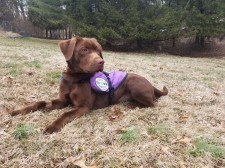Lifesaving Seizure Response Service Dog Delivered to 32-Year-Old Man in Newark, Delaware

NEWARK, Del., March 24, 2018 (Newswire.com) - A 32-year-old man named Allan from Newark, Delaware has just received a lifesaving Seizure Response service dog from Service Dogs by Warren Retrievers. Service Dogs by Warren Retrievers, or “SDWR,” has a mission to provide specially bred and custom-trained dogs for individuals of all ages with invisible disabilities like Autism Spectrum Disorder, PTSD, Diabetes, or in the case of Allan — a Seizure Disorder called Epilepsy. In addition to several hundred working dogs placed, there are hundreds of additional families already enrolled in SDWR’s program awaiting their service dog delivery. Allan’s dog, named “Rosa” has already received thousands of training hours as a Seizure Response Service Dog and will continue to learn under the guidance of a certified trainer from Service Dogs by Warren Retrievers and through the relationship it develops with Allan.
Allan has suffered from generalized juvenile myoclonic epilepsy (JME) since age 18. Allan’s disability carriers the potential for SUDEP, also known as sudden unexpected death in epileptic persons, which causes a heart attack triggered by the seizure. Unfortunately, Allan experienced SUDEP on July 23, 2016 when no one was home and he landed face-down on his arms for 2-4 hours before he was found. As as result of this tragic event, Allan had two fasciotomies in the left hand and the right hand and forearm leading to decreased function in both hands from the fall. His wife, Christina, must always make sure that there is someone around Allan to be present in case of a seizure. Whenever Allan goes out in public he must always be sure to have someone by his side who can assist should he need emergency help. “My wife has to take care of me and can never leave me alone. She has to be prepared for any emergency response that may be needed,” says Allan.
My wife has to take care of me and can never leave me alone. She has to be prepared for any emergency response that may be needed.
Allan, Seizure Response Dog Recipient
Because of Allan’s epilepsy, he also experiences some difficulty with balance along with some lack of awareness about surroundings and what’s happening around him. Epilepsy leads to fall risk, myoclonic jerk risk, and emergencies where hospital intervention is necessary. With Rosa by his side, Allan is confident that having a Seizure Response Dog will give him the freedom and independence he needs to face everyday challenges.
A Seizure Response Service Dog, such as Rosa, is trained to assist with tasks such as help Allan if he falls on the ground and roll him into recovery position if a seizure occurs. Rosa is highly trained to navigate spaces to safety, soften falls, as well as guard him during a seizure, and make him more aware of his surroundings. Rosa is also trained to bark to get people’s attention should Allan have a seizure and activate a life alert system. These specially trained Seizure Response Dogs, like Rosa, are also taught how to retrieve a phone or medications or food after a seizure has occurred and they also serve to act as a brace to help a seizure sufferer rise up after a seizure.
Rosa is also an honored graduate of the SDWR Fallen Officer Puppy Program. The Fallen Officer Puppy Program, or “FOPP,” is an initiative by SDWR to pay respect to the legacy of service by fallen American police who have sacrificed their lives in the line of duty. Rosa is named in honor of fallen Agent Victor M. Rosado-Rosa of the Puerto Rico Police Department, who was killed when his police motorcycle was struck by another vehicle in 2016. Rosa’s Seizure Response Service Dog work with Allan will carry on in memory of Agent Victor M. Rosado-Rosa.
With the new arrival of Rosa, Allan will have a four-legged tool that has received fundamental training to not only assist Allan during seizures but also help him to live a more independent and less stressful life. Thanks to the Americans with Disabilities Act (ADA), Allan’s service dog will be able to accompany him everywhere – from walking to work, to being at the office, to going to lunches and dinners, as well as going to professional conferences and meetings, and to class at the University of Delaware.
SDWR will continue to work with Allan’s family and Rosa, to train for specific needs they may have. What makes SDWR so unique from other nonprofit service dog organizations is this highly customized and tailored training program. SDWR trainers will continue to return for training sessions with Allan, his wife Christina, and Rosa for the next 18 months every 3-4 months to continue fine-tuning Rosa’s skills to best fit their lifestyle and Allan’s disability.
What sets SDWR apart from other nonprofit service dog organizations, is that they have no age restrictions and none of the enrolled families ever travel in order to receive their service dog or participate in team training. SDWR’s customized training methods and careful considerations are made in order to match every service dog to their “person.” Allan’s dog will work with the SDWR trainers over an 18-month training program towards public access training and certification. Through hard work and dedication, the organization, Allan and Rosa must work together to build on training foundations and fundamentals.
Service Dogs by Warren Retrievers is a nonprofit organization based in Madison, Virginia, and relies on donations to help the organization in its mission, “Until there’s a cure … there’s a dog.” To make or donation or learn more about SDWR, please visit http://www.sdwr.org. To learn more about Diabetic Alert Service Dogs visit http://www.sdwr.org/service-dogs/seizure. To find out how you can volunteer or serve as a service dog raiser visit http://www.sdwr.org/volunteer-opportunities.
Source: Service Dogs by Warren Retrievers
